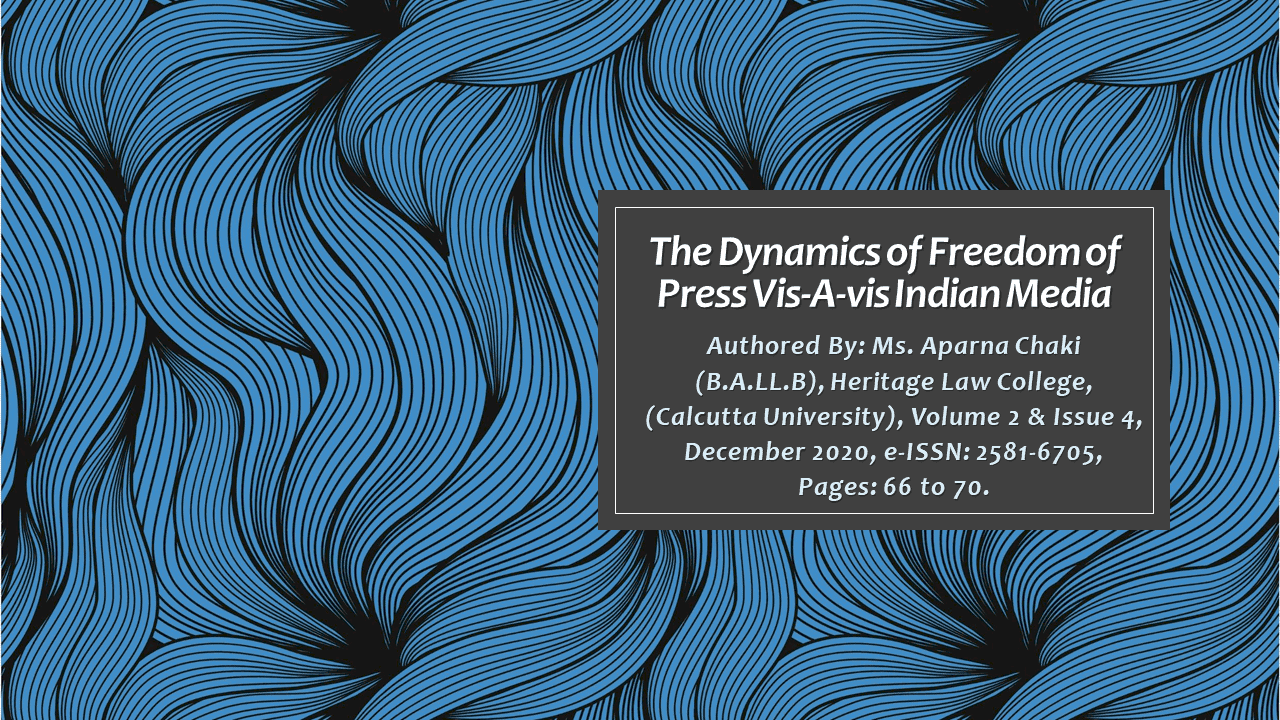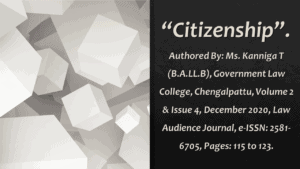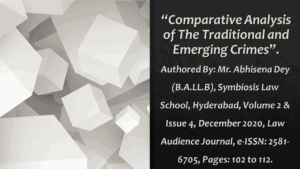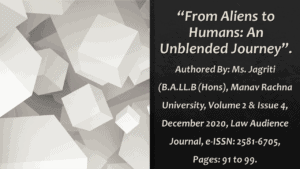Click here to download the full paper (PDF)
Authored By: Ms. Aparna Chaki (B.A.LL.B), Heritage Law College, (Calcutta University).
Click here for Copyright Policy.
Click here for Disclaimer.
I. INTRODUCTION:
Media is ranked as the fourth pillar of democracy and news journalism is considered as a cardinal illustration of media in India. Journalism, in itself, has many duties as well as responsibilities – to furnish the truth, speaking without getting daunted, give voice to the impecunious and their needs as well as requirements, address the queries of the masses to the concerned authorities and do reporting on diverse issues unescorted by any form of prejudice, bias and favouritism.
Nevertheless, journalism has effortlessly switched its focus from working for the advancement of society to simply procuring TRP ratings. Right from disrupting the private-public severance with inquisitive purpose, blabby edge smeared with profound shades of objectification as well as misogyny to the near network of powerful engrossment looking to sway content and flavouring of sham content to make it look genuine, media journalism today has been doing everything[1].
Journalism today has emerged to amplify stories in a way that induces excitement among the public with no precision in them. It has permuted into a dead duck obscured from its spirit fighting and dying daily for the struggle to present the truth to the public. Journalists these days are of the opinion that their way of reporting is supreme and cannot be wrong in any case. At variance with their treat with condescension belief, the journalists nowadays are staggering informers who only produce ill-conceived, absence of established information from erratic sources that question the integrity and legitimacy of the news. The concept of tabloid journalism as well as ‘breaking news’ is acknowledged but the way TV journalism is turning into an ‘unsavoury monster’ to attend the revenue models and make consumerism work is flawed and highly unacceptable[2].
II. RESPONSIBLE JOURNALISM UNDER THE INDIAN CONSTITUTION:
The power and significance of media in a democracy are notable. Article 19(1)(a) of the Indian Constitution grants freedom of speech and expression. Freedom of the press is also included within the same ambit. Media is a platform that helps one to articulate opinions and viewpoints.
It is significant in establishing views and opinions on diverse themes of regional, national as well as international subjects. The crucial role of the media is its propensity to organize the contemplation process of the people at large. Our country ran strong on three pillars – the legislature, the executive and the judiciary.
However, the guarantee of ‘freedom of speech and expression’ under Article 19 of our Constitution gave rise to the fourth pillar of our democracy – the Indian media. Since then, the media has been playing the role of a watchdog of the bureaucrats of the society and strives to address the wrongs happening in our society by putting them forward, hoping for emendation.
In the case of Indian Express Newspapers Private Ltd. v. Union of India, the Supreme Court held that the purpose of the press is to augment the public interest by printing such facts and viewpoints in absence of which citizens of the country may fail to make cognizant and sagacious judgments[3]. It was held that the press had a remarkable role to play in the operation of democratic machinery.
The Courts need to uphold the freedom of the press and let them gain access to all kinds of information along with the liberty to publish and circulate them. On the other hand, the media is also expected to be answerable and accountable to public opinion. It should not avail itself of the manifested mass irrationality that has been in existence in our society for a long time which fosters fake news and misinformation among the general public at large.
III. MEDIA TRIALS AND THE IMPEDIMENT THAT IT CAUSES:
Media trial is an embodiment of media delirium where individuals, corporations, or organizations are misreported which leads to superfluous conjecture in the minds of the viewers. Accordingly, the viewers acting irrationally and out of impulse condemn the individuals, corporations or organizations based on the media’s allegations, and such person or organization are as a result disgraced instead of having access to a free and fair trial which is everybody’s right. When such media trials are conducted on someone, it violates the very principle of criminal jurisprudence which mentions that unless the guilt is proved, every accused is presumed to be innocent. However, the way the media trials are conducted and people are accused of having committed an offence in all forms of media, notwithstanding the decision of a court of law, becomes a matter of grave perturbation given a democratic country like India which has a written constitution and following a rule of law.
The Hon’ble Supreme Court has time and again admonished the process of media trials as it impedes the administration of justice. In the case of R.K. Anand v. Registrar, Delhi High Court, the Apex Court recognized with some acuteness that free speech did not encompass the right to publish any report or execute sting operations with reference to any matter pending before the court[4]. During the ongoing process of criminal trials, if the media tries to develop a popular belief on innocence or guilt, it imperils the presumption of innocence which is of much importance[5].
Media trials are hence neither proficient nor authorized to hold. A lot of people hold the opinion that media trials should be considered as contempt of court and should be made punishable. They believe that the right to free trial should be available to all and unprejudiced by any publication or news that a channel broadcast. It is peremptory to understand that the notion behind democracy is fair play and transparency. By declaring an accused guilty of any offence before a fair trial being conducted eventually sabotaging their career makes the concept of a democratic and republic country distorted. In the recent death of late actor Sushant Singh Rajput, the media channels kept examining and cross-examining the witnesses related to the case. Some news channels even declared few witnesses and accused as the real culprits behind the death of the late actor. This led to the Press Council of India issuing an advisory that all media channels should cohere to the Norms of Journalism. Senior Judge of the Supreme Court K.G. Balakrishnan had once mentioned that on many occasions, actions by the media, for e.g., carrying certain photographs of the accused, had proved damaging to an ongoing case and resulted in the acquittal of the accused thereby denying justice to the victim[6].
There have been plenty of victims of such media manipulation. One such marked victims were Mr. Rajesh Talwar and his wife, Mrs. Nupur Talwar who was declared guilty by the media for the murder of their fourteen-year-old daughter Aarushi Talwar and their domestic help Hemraj without any indubitable and indefinite evidence.
A similar thing happened during the controversial and mysterious death of Sunanda Pushkar, the wife of politician Shashi Tharoor in the year 2014. The media ran parallel investigations along with the Delhi police’s investigations and lewd allegations on Mr. Tharoor which also included the charges of abetment of suicide of his late wife. Such allegations were all planted without any conclusive proof and nebulous shreds of evidence.
IV. REGULATORY MEASURES:
Journalism in India has acted as a stanchion of liberal democracy right from the Watergate Scandal to help find some important clues in the Jessica Lal Murder Case. Any restriction that has to be imposed on media needs to be reasonable and not anything that will cut down the potentiality and put limitations on the power of the media. Article 19 of the Indian Constitution gives the power to the media to convey itself through the ‘Right of speech and expression’. Nevertheless, Article 19(2) lays down certain reasonable restrictions while manifesting oneself. It should be the constitutional responsibility of the courts to certify that the restrictions imposed do not surpass them and puts as a limitation to the power of the media. The Press Council of India has a remarkable role to play as it controls the press in publishing bigoted content.
V. CONCLUSION:
In the modern era of globalization and liberalism, it is important for people to be informed about the happenings in society. Media was and continues to be one such essential source of extracting information regarding the same. Nevertheless, media trials that have been trending for a long have more of a negative repercussion rather than a positive one. A media controlled by the government shall make a country lose its status of ‘democracy’.
But this should not let the media attain supremacy and conduct media trials in a crude manner that it has been doing today. This not only harms the career and mental being of a person but also in certain cases, inhibits the judgment given by the court of law. The law impartially sorts out that any accused cannot pursue to restrain the demeanour of investigation or the mode of prosecution. To sum up, the courts should assess the ramifications of the publications and make sure that these do not account for a threat to the process of a free trial.
[1] Pamela Philipose, Backstory: Everything Wrong With the Media Is Reflected in the Sushant Singh Rajput Coverage, THE WIRE (Sep. 12, 2020), https://thewire.in/media/back-story-indian-media-sushant-singh-rajput-coverage.
[2] Shiralie Chaturvedi, ‘Spirals of Silence’: The Unsavoury Monster That Is the Indian Media Today, LIVEWIRE (Sep. 07, 2020), https://livewire.thewire.in/politics/rhea-chakraborty-sushant-singh-rajput-indian-media/.
[3] Indian Express Newspapers v. Union of India & Ors., A.I.R. 1986 SCR (2) 287 (India).
[4] R.K. Anand v. Registrar, Delhi High Court (2009) 8 SCC 106 (India).
[5] Raghav Tankha, Where Does Press Freedom End and Trial by Media Begin? THE WIRE (Sep.30, 2020), https://thewire.in/media/press-freedom-trial-by-media-supreme-court.
[6] Express News Service, ‘There is nothing wrong with trial by media’, THE INDIAN EXPRESS (Sep. 03, 2006, 12: 35 AM), http://archive.indianexpress.com/news/-there-is-nothing-wrong-with-trial-by-media-/11930/.



